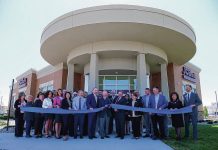In a reversal of a tax case stretching out for a dozen years, the Indiana Board of Tax Review has ruled in favor of the nonprofit Housing Partnerships Inc.
The Indiana Board of Tax Review has ordered that HPI be granted property tax exemptions for its housing projects for each year under appeal. The determination refers to about 60 properties during the assessment years of 2008, 2010, 2012, 2014 and 2016.
The ruling calls for Bartholomew County to repay the nonprofit $750,000 for property taxes paid from 2009-17, which includes all back taxes the county had charged during the appeals process, said Mark Lindenlaub, executive director of Thrive Alliance, which operates Housing Partnerships.
There’s also a matter of $234,000 in penalties and fees facing HPI that is being handled as a separate case in Shelby County Circuit Court. The Columbus-based agency paid about $15,000 of that amount last year, Lindenlaub said.
[sc:text-divider text-divider-title=”Story continues below gallery” ]Click here to purchase photos from this gallery
When all expenses are considered, the state is now ordering the county to surrender nearly $1 million to HPI, Bartholomew County Assessor Lew Wilson said.
For the past 29 years, the mission of HPI has been to provide quality affordable housing for families who otherwise could not afford a decent home, Lindenlaub said.
A shortage of safe, affordable housing in Columbus has been documented for decades.
Although the board of tax review’s decision will likely be seen as a victory by advocates for affordable housing efforts in Columbus, there has been little — if any — celebrating.
That’s because Wilson’s office is asking the Indiana Tax Court to review the board decision. In its Aug. 11 petition, the assessor’s office describes the board’s decision as “arbitrary, capricious and an abuse of discretion.”
Wilson said he believes the board accepted too much opinion as evidence, and failed to give fact-based guidance his office could use in making future property tax decisions.
Since another lengthy appeals process has been initiated, the current situation remains unchanged, Lindenlaub said. Not only does that mean that HPI won’t be getting money back any time soon, but also that his agency remains obligated to continue paying property taxes on its entire rental portfolio, he said.
While HPI has already sold six properties to pay a portion of the past taxes, the agency was also able to borrow money to handle the remaining debt, Lindenlaub said.
But from now on, the agency will have to rely on cash flow — rather than loans — to continue paying taxes, Lindenlaub said.
That could force HPI to sell an additional 11 affordable homes that Lindenlaub says will displace 15 adults and 12 children.
“More significantly, seven of these families — including nine children — are single-parent households with an average income of $21,270,” Lindenlaub said.
HPI has also spent about $160,000 in legal expenses during the appeals process that will likely never be recovered, he said.
History
Bartholomew County Assessor Tom Owens in 2006 broke years of precedent by denying property tax exemption for HPI-managed properties.
Under Owens’ guidance, the Bartholomew County Property Tax Board of Appeals determined in early 2007 that HPI housing did not meet the definition of a charitable purpose because it did not relieve government of a burden.
Although Wilson succeeded Owens in 2011, the tax board of appeals has continued to maintain that all HPI properties are 100 percent taxable.
Two different state-level appeals ended with rulings in the assessor’s favor, and the Indiana Supreme Court declined to hear the matter in 2015.
Those earlier decisions essentially destroyed the business model that HPI was locked into, Lindenlaub said. As a result, his agency was denied credit by two local banks, faced delays in receiving state grants and struggled with tax liens that restricted its ability to sell property to pay off those liens, he said.
In the wake, the city’s chronic housing shortage worsened, leaving some families unable to pay for basic needs. Battered spouses and children were unable to move out of violent situations, people fighting drug addictions were left incapable of seeking treatment and former inmates were unable to transition back into society, Lindenlaub said.
“We all lose,” Lindenlaub said. “”When families are stuck in these situations, they are unable to contribute their skills and talents to the community, and our entire community is diminished.”
But from Wilson’s perspective, the granting of exemptions could drive some of the lower-priced landlords out of business, he said.
It is those landlords who pay about 15 percent of their rental income out in taxes that help fund local government services, Wilson said.
Reversal
Wilson said he was taken by surprise when the Indiana Board of Tax Review reversed earlier rulings by stating that HPI has proven its scattered-site housing was used for charitable purposes.
According to the board’s ruling, its decision was based on evidence showing the organization funds its housing projects from several different sources, including sale and rental income, volunteer labor, donations from individuals and businesses, and grants from private sources, as well as public, the ruling stated.
Other efforts that prove HPI is charitable include paying the cost of tenants to attend credit counseling sessions, offering classes on how to buy homes and make repairs, writing recommendation letters, and taking tenants to Alcoholics Anonymous meetings, according to the board’s written determination.
The ruling also states that HPI “appreciably relieved a governmental burden and that its activities therefore provided a public benefit sufficient to justify the loss of tax revenue.”
All of these determinations came out of a two-day hearing held last August, where HPI submitted 64 documents into evidence to support its case, while the assessor’s office submitted 18.
One key document from HPI was the “Asset Limited, Income Constrained, Employed” (ALICE) study, which showed that between 28 to 34 percent of of Bartholomew County households were either in poverty or below the income threshold established by the study.
The board also cited the waiting list of about 600 families requesting low-income housing through the Columbus Housing Authority.
A number of witnesses also spoke on behalf of HPI such as former Columbus Housing Authority executive director Deborah Holt and Tracy Souza, president and CEO of the Heritage Fund — The Community Foundation of Bartholomew County.
According to the written determination, their testimony uniformly stated that by providing quality housing at rents lower than what other landlords charged, HPI had helped make its tenants more self-sufficient and less reliant on government programs such as Section 8 vouchers, food stamps and subsidized health care.
Working together with elected officials, local businesses and hundreds of volunteers to create safe, Housing Partnerships has created more than 500 affording homes in Columbus.
Appeal
At the time the determination favoring HPI was issued June 29, the Indiana Board of Tax Review gave Wilson’s office 45 days to decide whether it would take the matter to the Indiana Tax Court.
Lindenlaub, who said his agency decided not to make any announcement about its victory until after they discovered how the county would respond, said HPI was hoping the assessor’s office would quietly accept the latest determination.
That wasn’t just wishful thinking. The agency thought the county might determine it would be too expensive to appeal to the Indiana Tax Court, Lindenlaub said.
As long as previous determinations were in favor of the assessor’s office, the Indiana Attorney General’s office argued on behalf of the county. But since the latest decision favors HPI, the county will have to handle its own legal matters at the expense of county taxpayers, Wilson confirmed.
Nevertheless, the petition for review was filed Aug. 10, three days before the 45-day deadline arrived.
The petition questions why the Indiana Board of Tax Review gave a completely different determination when there haven’t been any substantial changes in laws, regulations and facts in the case.
The assessor’s office also claims the June determination was “based only on snippets of information and broad conclusory statements without the necessary proof,” according to the petition.
In appealing, Wilson said he is following state and local statutes as he sees them to fulfill his responsibilities.
What’s next?
It will likely take at least one year for the Indiana Tax Court to make a determination on the assessor’s petition, Lindenlaub said. While HPI will have to continue paying taxes during that time, Lindenlaub believes banks and other financial institutions may be more willing to work with his agency after the June ruling by the Indiana Board of Tax Review.
Instead of seeking reelection this year, Wilson ran for 59th District State Representative, and was defeated in the GOP primary by Ryan Lauer. That means Ginny Whipple, a Republican running unopposed for county assessor in the November election, will succeed Wilson at the end of the year.
But that upcoming transition isn’t expected to have any impact on the way the assessor’s office continues to handle the HPI matter, Wilson said.
[sc:pullout-title pullout-title=”Tax controversy timeline ” ][sc:pullout-text-begin]
2002: Housing Partnerships, Inc. is granted a two-year property tax exemption on an office building and all rental properties by then-Bartholomew County Assessor Tom Owens.
2004: The same exemption is granted by Owens for another two-year period.
2002-06: HPI develops 34 rental homes budgeted on property tax exemption and has 10 additional rental homes in process.
2006: Owens denies property tax exemption on HPI office building and all rental properties.
February 2007: The Bartholomew County Property Tax Board of Appeals unholds Owens’ determination. The decision is appealed to the Indiana Board of Tax Review.
January 2009: Indiana Board of Tax Review hearing.
January 2011: Lew Wilson succeeds Owens as county assessor.
April 2011: The state board issues a decision that it will not overturn Owens’ 2006 decision. The matter is appealed to the Indiana Tax Court.
December 2011: Indiana Tax Court hearing.
June 2014: Indiana Tax Court issues opinion upholding denial of tax exemption. HPI contends the court maintained a narrower and higher standard than state statues that govern property tax exemption.
July 2014: While HPI petitions the Indiana Tax Court for a rehearing, the court declines.
December 2014: HPI files an appeal to the Indiana Supreme Court. The Indiana Association for Community Economic Development asks the state’s highest court to allow it to provide evidence and testimony in HPI’s favor.
April 2015: The Indiana Supreme Court announced its 3-2 decision not to hear HPI’s appeal.
August 2017: A two-day hearing is held before the Indiana Board of Tax Review regarding property taxes paid by HPI from 2008-2016.
June 2018: The state board reverses its two earlier determinations, and rules in HPI’s favor.
August 2018: The assessor’s office petitions the Indiana Tax Court to review the board decision.
Source: Housing Partnerships Inc.
[sc:pullout-text-end][sc:pullout-title pullout-title=”About HPI” ][sc:pullout-text-begin]
Since 1989, Housing Partnerships, Inc. has worked alongside local elected officials, businesses, and thousands of volunteers to build safe, affordable housing in Columbus.
Now a part of Thrive Alliance, HPI has attracted more than $14 million in grants and an estimated $35 million in private investment, to create more than 500 safe, affordable homes.
These homes serve lower-income families and special-needs populations, including seniors, people with disabilities, survivors of domestic violence, single-parent families, and families affected by addiction.
Source: Housing Partnerships Inc.
[sc:pullout-text-end][sc:pullout-title pullout-title=”Property tax appeal process” ][sc:pullout-text-begin]
A property tax appeal begins with filing a Form 130 – Taxpayer’s Notice to Initiate an Appeal with the local assessing official that detail the pertinent facts of why the assessed value is being disputed.
Following an informal conference with the local assessing official, the assessor will make a recommendation either denying or approving the appeal.
If denied, the appeal will be forwarded to the county Property Tax Assessment Board of Appeals (PTABOA) for review.
Current members of that board in Bartholomew County are Mary Rigsby, Todd Boilanger and Sandra Beatty. While current county assessor Lew Wilson serves as secretary, he is a non-voting member.
All current members of the PTABOA have terms scheduled to expire at the end of this year when Wilson is succeeded by Ginny Whipple.
If the PTABOA denies the appeal, instructions will be provided on appealing the decision to the Indiana Board of Tax Review.
After being heard by the Indiana Board of Tax Review, taxpayers may also seek review by the Indiana Tax Court.
Source: Indiana Department of Local Government Finance.
[sc:pullout-text-end]




